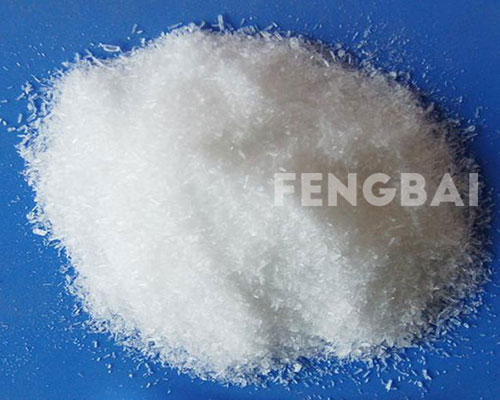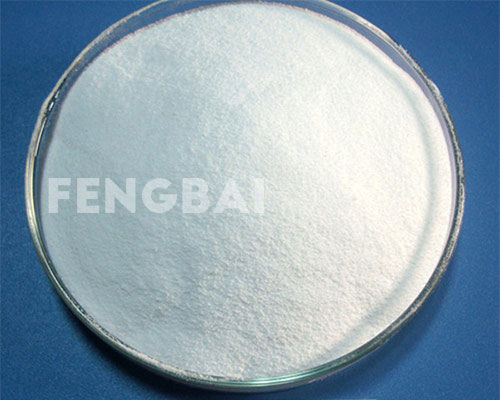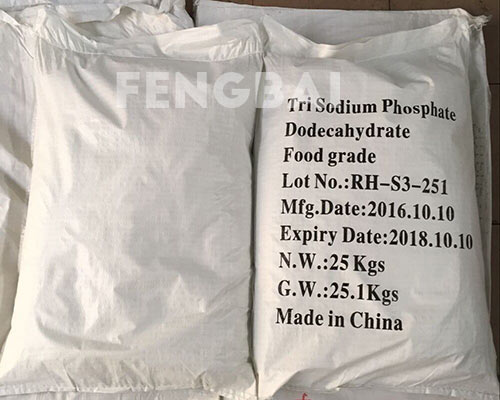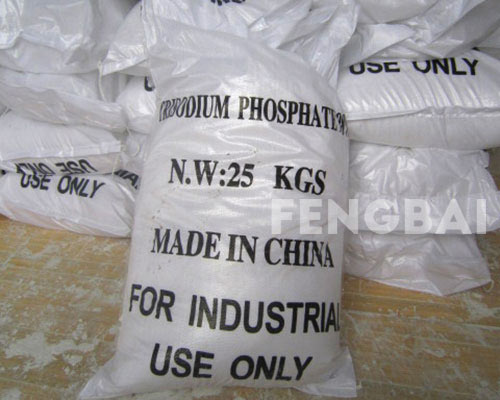- Name: Trisodium Phosphate
- Form: White Crystal Powder
- Main contents% ≥: 98
- CAS NO.: 7601-54-9
- HS Code: 28352910
- Chemical Formula: Na3PO4.XH2O(X=0,12)
Trisodium phosphate (TSP), chemically known as trisodium phosphate dodecahydrate (Na₃PO₄·12H₂O), has an anhydrous form of Na₃PO₄, It is an inorganic compound with strong alkalinity and exhibits multiple functions including chelating, emulsifying, and dispersing properties. Due to its unique physicochemical characteristics, TSP chemical is widely used in industrial cleaning, food processing, and water treatment, and it also serves as a key raw material in detergents and ceramic glazes.
| Items | TSP.12H2O | TSP Anhydrous |
| Main contents% ≥ | 98.0 | 98.0 |
| Content (P2O5) ≥% ≥% | 18.3 | 39.5 |
| Sulfate as SO4 % ≤ | 0.5 | 0.5 |
| Water insoluble% ≤ | 0.1 | 0.1 |
| Chloride as Cl% ≤ | 0.4 | 0.4 |
| As w/% ≤ | 0.005 | 0.005 |
| Fe w/% ≤ | 0.01 | 0.01 |
| PH(10g/L) % | 11.5-12.5 | 11.5-12.5 |
| Package | In double layer bags of 25 Kg or 50 Kg or 1000 Kg net. | |
Industrial grade trisodium phosphate appears as a colorless or white crystalline powder, also available in bulk and granular forms. Dodecahydrate is colorless, transparent, or white, needle-shaped crystals that weather easily in air, gradually losing their water of crystallization and becoming anhydrous (Na₃PO₄). The dominant forms on the market are the dodecahydrate (60%) and the anhydrous (40%). The former offers better solubility, while the latter is suitable for high-concentration applications.
Main Uses of Trisodium Phosphate (TSP) 98%
As a multi-functional inorganic compound, trisodium phosphate (TSP) combines strong alkalinity with chelating and emulsifying properties, enabling its wide application in industrial cleaning, detergent production, and food processing.
(1) Industrial Cleaning Applications
- Metal Surface Cleaning. Used for degreasing and descaling of metal workpieces such as steel, aluminum, and zinc, including automotive parts and mechanical components. It removes scale by chelating metal ions and eliminates grease through emulsification. In addition, it forms a passivation layer on metal surfaces after cleaning, providing short-term rust protection.
- Equipment and Pipeline Cleaning. Applied in the cleaning of boilers, heat exchangers, and pipelines. A 1%–5% TSP solution circulated at 80–90°C effectively dissolves water scale such as calcium carbonate and magnesium hydroxide while minimizing corrosion to equipment surfaces.
- Textile and Dyeing Pretreatment. Used as a desizing and scouring agent for textile fibers. It removes starch-based sizing agents and oils from cotton fabrics, improving whiteness and dye uniformity, while regulating the pH of dye baths to enhance dye adhesion.
(2) Detergents and Home Care Products
- Synthetic detergents. As important additives in laundry detergents and dishwashing liquids, they account for 5%-10% of the detergent formula. Their main functions include: chelating calcium and magnesium ions in water (softening water), enhancing surfactant activity (improving detergency), and stabilizing the pH value of detergents (preventing deterioration).
- Soap Manufacturing. Used in the “salting-out” process of soap production. The addition of TSP promotes soap separation from the saponification mixture while removing impurities such as glycerin, improving the hardness and structural stability of soap.
- Oral Care Products. Serves as a pH regulator and anti-tartar agent in toothpaste. By maintaining paste pH at 8.0–9.0, it inhibits bacterial growth. It also chelates calcium compounds on tooth surfaces to prevent tartar formation.
(3) Food Processing
- Food quality improver: Adding 0.1%-0.3% tsp to meat products (such as sausages and ham) can improve the meat’s water retention and elasticity, enhancing its taste. It is also used in aquatic product processing to remove fishy smells by creating an alkaline environment to break down fishy substances.
- Food preservative: For fruit and vegetable preservation, soaking in a 1%-2% trisodium phosphate solution forms a protective film on the surface, inhibiting microbial growth and extending shelf life.
- Food processing aid: Used in sugar refining and brewing for pH adjustment, and in dairy processing for whey separation to improve product purity.
(4) Other Applications
- Water Treatment. Functions as a boiler water softener by chelating calcium and magnesium ions to prevent scale formation. In wastewater treatment, it neutralizes acidic effluents and precipitates heavy metal ions for compliant discharge.
- Ceramics and Glass Manufacturing. Acts as a flux in ceramic glazes to reduce melting temperature and improve surface gloss. In glass production, it is used to adjust chemical stability.
- Paper Industry. Used as a deinking agent and sizing agent in paper recycling, removing residual ink from waste paper and improving paper water resistance.
1. Strong Alkalinity and pH Regulation
A 1% aqueous solution of TSP has a pH of 11.5–12.0, indicating strong alkalinity. It effectively neutralizes acidic substances and has strong buffering capacity, helping maintain system pH stability. This makes it suitable for alkaline cleaning processes in industrial applications.
2. Metal Ion Chelation
TSP trisodium phosphate forms stable, soluble chelates with metal ions such as calcium, magnesium, and iron. This allows it to remove hardness ions from water, prevent scale formation, and inhibit catalytic degradation of detergents caused by metal ions.
3. Emulsifying and Dispersing Actions:
The product has good emulsifying ability for oils and greases, dispersing them into fine particles for easy removal during cleaning. It also disperses solid contaminants such as dirt and rust, preventing redeposition during washing.
4. Double Decomposition Reactions:
This chemical reacts with acids to form disodium hydrogen phosphate and sodium dihydrogen phosphate. It also reacts with metal salts to produce insoluble phosphate precipitates (e.g., reaction with silver nitrate produces yellow silver phosphate). These properties make it applicable in chemical analysis and wastewater treatment.
(1) Storage Conditions
Store in a dry, well-ventilated warehouse. The storage temperature should not exceed 30°C with relative humidity below 75%. Keep away from acids, metal powders, and food raw materials. Avoid exposure to air to prevent efflorescence and caking. The dodecahydrate form requires extra moisture protection and should not be stored for more than 6 months.
(2) Packaging Requirements
Standard packaging consists of an inner polyethylene liner with an outer polypropylene woven bag, with a net weight of 25 kg or 50 kg per bag. Food-grade products must use food-grade packaging materials and be clearly labeled as “Food Additive”.
(3) Transportation
Protect from rain and direct sunlight during transit. Handle with care during loading and unloading to prevent bag damage. In case of leakage, absorb the spilled material with dry sand and collect for proper disposal; do not wash away with water
WHY CHOOSE FENGBAI
- With more than 15 years of experience in the water treatment chemical industry.
- Owning the most advanced production workshops and technology.
- Quality certifications: ISO9001, SGS, HACCP, KOSHER, HALAL, etc.
- Fengbai always provides high quality products, excellent services and factory prices for all the clients.




